Key takeaways:
- Indigenous practices foster a profound connection to the land, emphasizing harmony with nature and community.
- Indigenous Knowledge Systems offer holistic, ecologically wise insights that can address modern challenges.
- Personal engagement with indigenous communities deepens appreciation for their cultural significance and storytelling.
- Challenges like misinterpretation, commodification, and time constraints threaten the preservation of indigenous traditions.
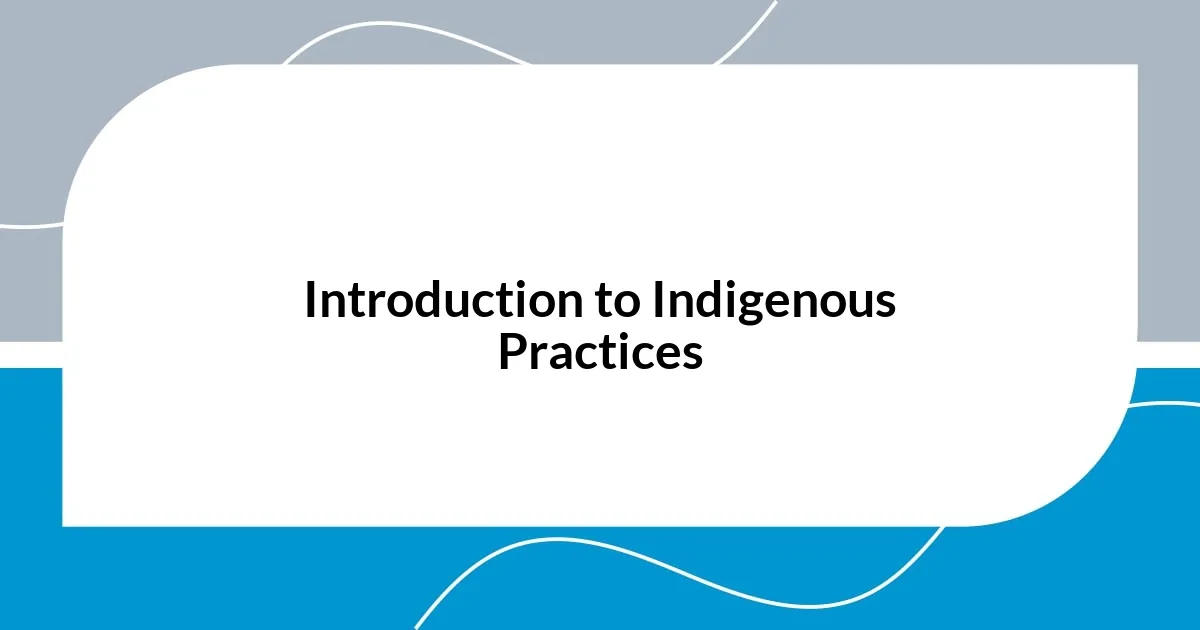
Introduction to Indigenous Practices
Indigenous practices encompass a vast array of traditions, beliefs, and customs that have been passed down through generations. I remember my first encounter with these practices during a community gathering, where the vibrant energy of storytelling ignited a sense of connection and respect for the deep-rooted knowledge shared by the elders. It’s fascinating how these practices are not just historical but also deeply relevant in today’s world—how do they shape our understanding of community and connection?
At the heart of indigenous practices lies a profound relationship with the land. This connection resonates with me whenever I see a ceremony that honors natural elements, like the water or the trees, which often feels like a sacred ritual reminding us of our place within the ecosystem. Have you ever thought about how your own practices might reflect your relationship with nature?
Exploring indigenous practices invites us into a space of reflection and understanding. I often find myself pondering how integrating these time-honored traditions into modern life could enrich our daily experiences. Can embracing these values help us lead more harmonious and balanced lives in today’s fast-paced world?
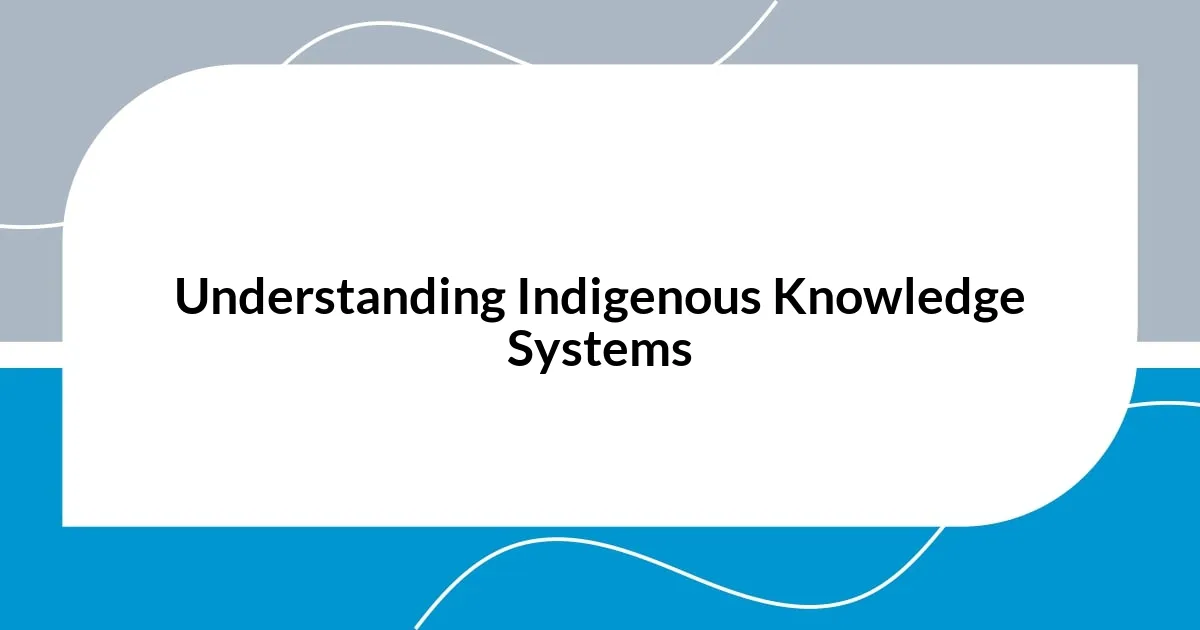
Understanding Indigenous Knowledge Systems
Understanding Indigenous Knowledge Systems is essential for grasping the richness of indigenous cultures. I remember sitting around a fire with community elders, listening to their stories about the stars and seasonal changes. Their narratives weren’t just tales; they embodied centuries of ecological wisdom, teaching us about the natural world’s cycles and the importance of living in harmony with them.
In my experiences, I’ve realized that indigenous knowledge is often holistic—encompassing not just practical skills, but also spiritual and emotional dimensions. For instance, when participating in a traditional harvesting event, I felt a connection to both the food we gathered and the ancestors who had done the same. This interwoven knowledge fosters a sense of belonging that transcends time, reminding us how deeply our lives are tied to the land.
Moreover, I’ve found that indigenous knowledge systems emphasize community resilience and adaptability. While working with a local group on a sustainability project, we utilized traditional ecological practices to better manage our resources. The insights derived from those age-old techniques offered innovative solutions that seemed to resonate with the challenges we face today. Isn’t it fascinating how these practices provide a framework for addressing contemporary issues in our increasingly complex world?
| Indigenous Knowledge Systems | Modern Knowledge Systems |
|---|---|
| Holistic view: Integrates nature, community, and spirituality | Often fragmented: Focuses on specialization and compartmentalization |
| Passed down through generations, emphasizing tradition | Continuously evolving, often prioritizing innovation |
| Focus on sustainability and balance with nature | Frequently driven by growth and resource extraction |
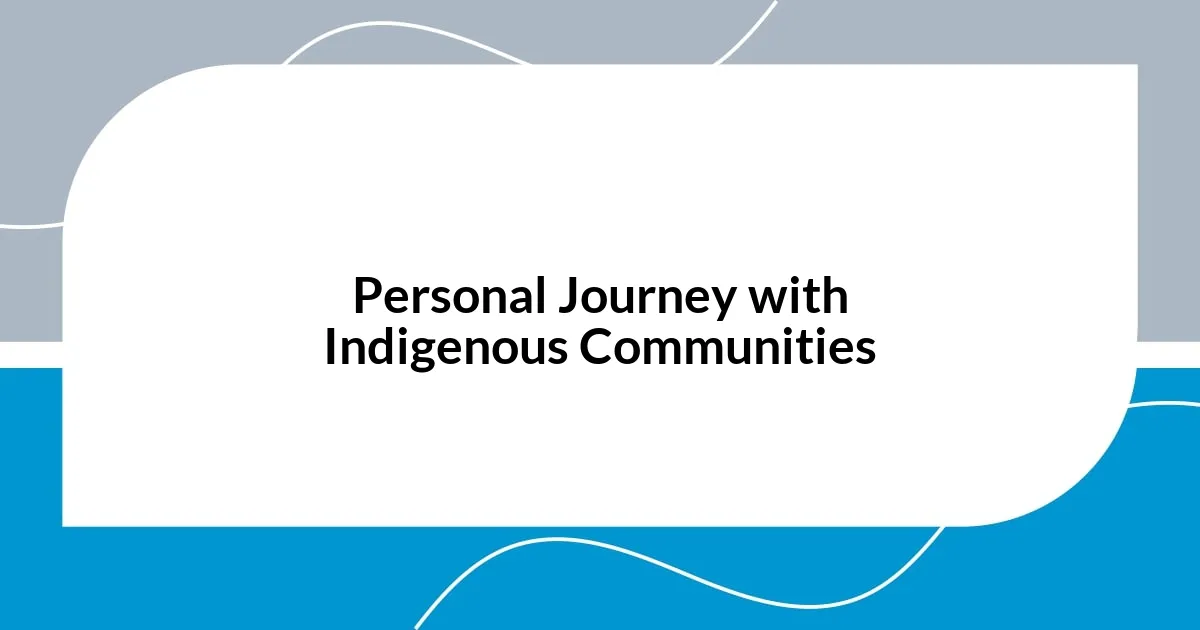
Personal Journey with Indigenous Communities
My journey with indigenous communities has been a tapestry of meaningful connections and profound lessons. During one memorable visit, I joined a group of young people learning traditional weaving techniques. As the fibers slipped through my fingers, I felt an unexpected sense of pride and belonging wash over me. The act of weaving wasn’t just about creating fabric; it symbolized the weaving together of stories, cultures, and generations.
- Engaging with indigenous youth revitalized my appreciation for art as a means of storytelling.
- Participating in a healing circle deepened my understanding of mental health and community support.
- Sharing meals made from locally-sourced ingredients highlighted the importance of food sovereignty and cultural continuity.
I’ve often found that these experiences shape not only my perspectives but also my personal values. For instance, attending a sacred ceremony provided me with moments of deep reflection. I still remember the weathered faces of the elders, illuminated by firelight, as they shared their wisdom. Their words resonated with an intensity that made me recognize the timeless relevance of their teachings in my own life.
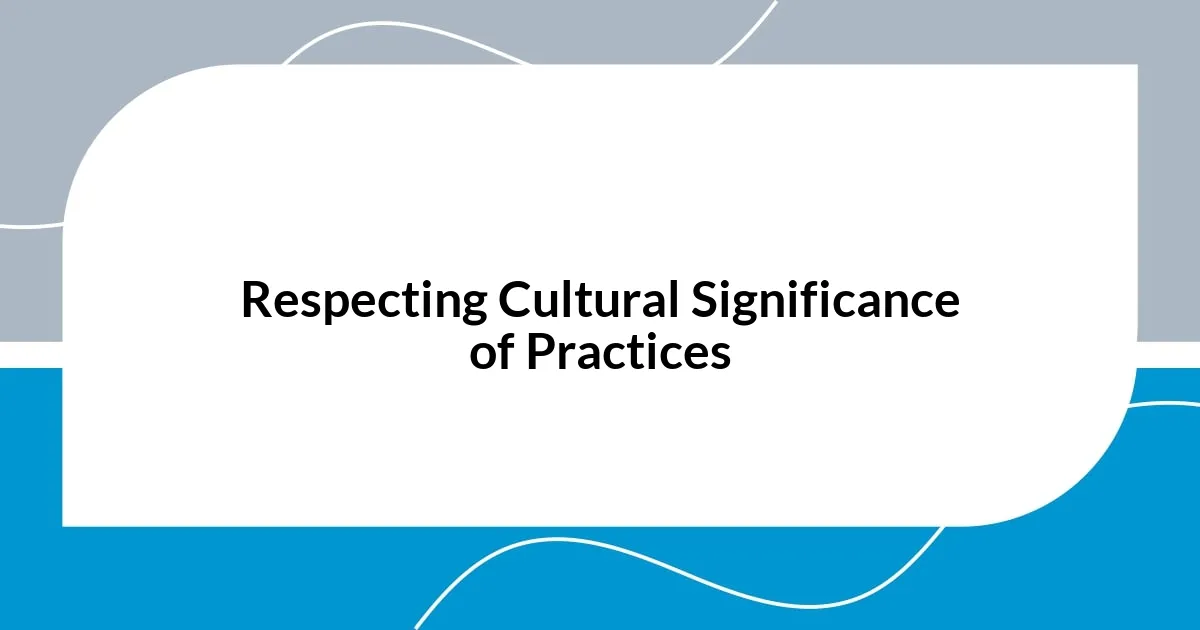
Respecting Cultural Significance of Practices
Respecting the cultural significance of indigenous practices is something I’ve come to deeply appreciate through my interactions with various communities. I recall visiting a sacred site where the locals performed a ritual connecting them to their ancestors. Standing there, I felt a palpable energy, as if the air was thick with the stories of those who had come before. It struck me—how often do we take for granted the narratives woven into these practices, failing to realize they are key to community identity and continuity?
One particular moment stays with me: I attended a storytelling gathering, where elders shared tales that painted vivid pictures of their history and values. As they spoke, I noticed the younger generation listening intently, their eyes wide with curiosity. It made me wonder—how often do we see our own histories reflected in the stories we tell or share? That evening, it became clear that respecting these cultural expressions not only honors the past but also enriches our collective future.
Furthermore, I’ve learned that embracing indigenous values often calls for introspection and humility. I remember a community meeting where I was invited to share my thoughts, but I quickly realized it was more important to listen and learn. To respect their practices means recognizing the depth of their wisdom and understanding that there’s so much more to gain from being a participant rather than a spectator. How can we truly appreciate these practices if we don’t dive in and immerse ourselves fully?
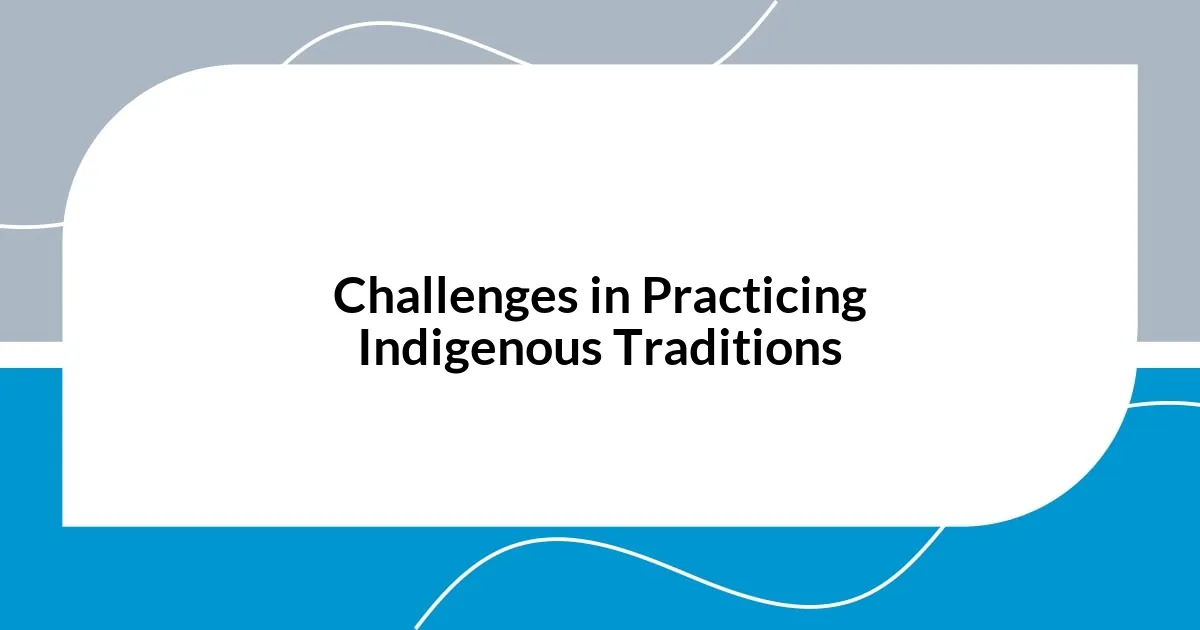
Challenges in Practicing Indigenous Traditions
Engaging with indigenous traditions often brings to light some challenging barriers. I vividly recall my first participation in a sweat lodge ceremony. The intensity of the heat and tight confines felt overwhelming at times. But what struck me most was how fear of judgment can prevent individuals from fully trusting the process. I thought, how often do our own insecurities hold us back from experiencing healing in communal spaces?
Another challenge is the misinterpretation of practices by outsiders. During a cultural festival, I witnessed a vendor trying to profit from sacred symbols without understanding their significance. It pained me to see this commodification overshadow the spiritual value of these items. I wondered, how can we cultivate respect and ensure that these practices are honored, rather than exploited? Foster genuine curiosity and respect for the deeper meanings behind these traditions can help address this issue.
Time also plays a crucial role in keeping indigenous traditions alive. Participating in seasonal ceremonies, I realized the demands of modern life often conflict with these practices. When people have to prioritize work or daily responsibilities, how can we expect these valuable traditions to thrive? It’s essential to recognize that maintaining a connection to culture requires intentional effort and community support, creating spaces where these practices can evolve and flourish amidst contemporary challenges.